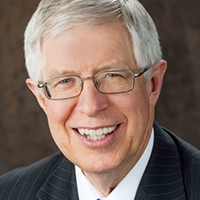3 Powerful Leadership and Mentorship Pillars

This article about powerful global leadership and mentorship pillars is based on an interview of Lew Cramer by Alan Olsen, CPA on his American Dreams show on behalf of Legacy Builder’s invitation only philanthropy events.

Click image to view full interview.
In an era where global connections and visionary leadership drive progress, few individuals embody these principles as effectively as Mr. Cramer. As the President and CEO of Colliers International Utah, Lew has built a storied career in public service, international trade, and commercial real estate. From shaping U.S. trade policy to mentoring tomorrow’s leaders, his journey offers invaluable lessons for anyone seeking to excel in leadership, business, or community building; see his recent interview.
From Mesa to the Global Stage: Mr. Cramer’s Career Path
Mr. Cramer’s remarkable journey began in Mesa, Arizona, long before Stanford during the politically charged 1960s. After serving a mission in Berlin during the Cold War, he returned to the U.S., where his career took off. His experiences practicing law in Silicon Valley and Los Angeles laid the foundation for his later roles in Washington, D.C., as a White House Fellow under President Reagan. His rapid ascent to Deputy Assistant Secretary of Commerce and later Assistant Secretary of Commerce for International Trade reflects his exceptional ability to navigate complex political and economic landscapes.
“Adaptability and embracing new challenges are hallmarks of successful leaders.”
The Harvard Business Review emphasizes the importance of varied experiences for leaders, noting that diverse career paths foster creativity and resilience (HBR, 2020).
Championing International Trade: Utah’s Export Success
As Director General of the U.S. Commercial Service, Lew managed 1,400 commercial attachés stationed globally. His passion for fostering international relationships culminated in co-founding the World Trade Center Utah with Governor Jon Huntsman. Under his leadership, Utah tripled its international exports, achieving a positive trade balance even during economic downturns.
“Strategic partnerships and a global mindset are essential for economic resilience.”
A report from the World Bank underscores the role of international trade policies in driving sustainable economic growth (World Bank, 2019). Lew’s work with the World Trade Center Utah aligns with these best practices.
Building Communities Through Real Estate
In his current role as CEO of Colliers International Utah, Lew oversees the largest commercial real estate firm in the Mountain West. His emphasis on sustainable development and ethical habits reflects his commitment to creating vibrant, thriving communities.
“Real estate is about more than transactions; it’s about shaping the future.”
McKinsey’s research highlights the critical role of commercial real estate in urban development, emphasizing the need for sustainability and long-term planning (McKinsey, 2022). Lew’s philosophy mirrors these trends, positioning Colliers as a leader in the industry.
Future Leaders
Good mentorship is a pivotal factor in fostering the growth of junior employees within an organization. A good mentor leverages their expertise and emotional intelligence to evaluate the unique needs and potential of their mentees. By setting clear goals and providing structured coaching, mentors contribute to their mentee’s growth, helping them achieve higher job satisfaction and professional success.
Mentorship also involves a willingness to invest time and resources in building a supportive culture, where constructive feedback and open discussions are the norm. This commitment strengthens the responsibility of both the mentor and mentee to actively participate in the exchange of knowledge and skills, while also fostering leadership skills that are essential for long-term leadership development.
Mentorship also extends beyond individual growth to influence organizational success. Effective mentors encourage junior employees to engage in networking opportunities, enabling them to broaden their perspectives and establish valuable professional relationships. Discussing strategies for success, sharing challenges, and modeling leadership qualities, mentors pave the way for future leaders. When organizations prioritize mentorship, they build a culture where emotional intelligence is valued, and collaborative learning thrives. This approach not only empowers employees but makes an organization more resilient and innovative.
Leadership Mentoring Program
A leadership mentoring program is designed to prepare individuals for leadership positions by fostering growth and self-awareness. It involves setting clear goals that align with both the mentor’s guidance and the mentee’s development needs. Programs often incorporate reverse mentoring, where insights flow both ways, allowing mentors to learn from their mentees while addressing areas for improvement. By focusing on identifying strengths and weaknesses, these programs create opportunities for meaningful progress, ensuring the next generation of leaders are equipped with the skills and confidence to excel.
Effective mentoring programs emphasize the development of essential skills that enable mentees to grow and thrive in their respective fields and professional relationships. By focusing on personalized guidance, these programs help mentees build competencies in areas such as leadership skills, preparing them to lead with confidence. Additionally, a well-structured program not only enhances the mentees’ abilities but also fosters a collaborative environment where leadership development is prioritized, allowing mentors to refine their approaches and ensuring continuous improvement for both parties.
The Pillars of Leadership and Mentorship: Collaboration, Cooperation, and Communication
Lew credits much of his success to what he calls the three C’s:
- Collaboration
- Cooperation
- Communication.
Whether negotiating trade agreements or mentoring young professionals, these philosophies have guided his approach. His ability to build consensus and foster trust has been key to his effectiveness as a leader.
“The best leaders prioritize mutual respect and shared goals.”
Gallup’s research shows that leaders who emphasize collaboration and clear communication drive higher engagement and performance (Gallup, 2018).
Lessons from Mr. Cramer’s Career
- Adaptability Leads to Growth: From law to public service to real estate, Lew’s career exemplifies the power of embracing change.
- Global Perspectives Matter: Building international connections fosters economic resilience and innovation.
- Mentorship Multiplies Impact: By guiding others, leaders ensure their legacy extends beyond their immediate contributions.
- Values Shape Leadership: Collaboration, cooperation, and communication are foundational to effective leadership.
Mentorship and Legacy Building
Lew’s dedication to mentoring the next generation of leaders is another cornerstone of his legacy. He believes in the power of service and instills in his mentees the importance of giving back.
“The best way to repay a mentor is to pay it forward.”
Studies from the National Mentoring Partnership highlight the long-term benefits of mentorship, including increased career satisfaction and organizational success (Mentor, 2021).
Faith and Service: A Life of Purpose
Beyond his professional achievements, Lew and his wife, Barbara, are deeply committed to their faith and community. Their upcoming mission to London, England, reflects this.
“A fulfilling life balances career success with meaningful contributions to faith and community.”
Pew Research studies show that individuals engaged in faith-based community service experience higher levels of purpose and satisfaction (Pew Research, 2017).
Final Takeaway: Leave a Legacy of Leadership and Service
Mr. Cramer’s life is a testament to the power of vision, collaboration, and a commitment to service. From shaping U.S. trade policy to mentoring potential leaders, his story offers practical lessons for navigating complex challenges and making a lasting impact. As he transitions to his new role in London, his example continues to inspire, lead, and mentor those around him.
For those seeking actionable insights into leadership, mentorship, and global engagement, Lew’s journey serves as both a blueprint and a source of inspiration.
To view more content like this, click here to subscribe to our YouTube channel
And click here to receive our FREE Newsletter.


More About Mr. Cramer:
Lew’s career began after earning his law degree, when he practiced law in Silicon Valley and Los Angeles before moving to Washington, D.C., where he was selected as a White House Fellow during the Reagan administration. He quickly advanced to key roles within the U.S. Department of Commerce, including Deputy Assistant Secretary of Commerce and Assistant Secretary of Commerce for International Trade. In these positions, Lew was instrumental in shaping U.S. trade policy and fostering international economic relationships.
His leadership and expertise extended to the global stage during his tenure as the Director General of the U.S. Commercial Service, where he managed 1,400 commercial attachés stationed in embassies and consulates around the world. Lew’s contributions to international trade continued when he co-founded the World Trade Center Utah alongside Governor Jon Huntsman. Under Lew’s leadership, Utah experienced significant growth in international exports, becoming the only state to maintain a positive trade balance during economic downturns.
Lew’s influence extends beyond his professional achievements. He is deeply committed to mentorship and education, regularly guiding future leaders in their careers. His approach to leadership is grounded in the principles of collaboration, cooperation, and communication—values he has championed throughout his career.
In addition to his professional responsibilities, Lew and his wife, Barbara, are actively involved in their community and faith. They are set to embark on a two-year mission to London, England, where they will serve as diplomatic collaborators and interfaith bridge-builders for The Church of Jesus Christ of Latter-day Saints.
Lew Cramer’s legacy is one of service, leadership, and a commitment to fostering global relationships. His work has left an indelible mark on the fields of international trade and commercial real estate, and he continues to inspire others with his dedication to making a positive impact in the world.
Faith, Freight & “Slaying the Tomb”
How the Moscrips Drove From Freight Tech to Faith-Fueled Media When Scott Moscrip launched Truckstop.com from a spare bedroom in 1995, he didn’t just build a freight-matching marketplace—he rewired a blue-collar industry for the Internet age. Thirty years, five kids, and one mayoral term later, the Idaho technologist and his wife, Carmen, are chasing an…
From the Streets to Self-Reliance
How Joseph Grenny’s Other Side Village Is Rewriting the Homelessness Playbook A 2 a.m. Alarm and a Box of World-Class Doughnuts At two o’clock each morning in downtown Salt Lake City, former rough-sleepers slip into spotless aprons, fire up industrial mixers, and begin turning out pillowy brioche rings glazed with passion-fruit icing and drizzled…
Building a Legacy: A Fireside Chat with Martin Luther King III
In a thought-provoking fireside chat at our Legacy Builder’s Conference, Martin Luther King III shared profound insights on the concept of legacy, leadership, and the moral imperatives facing society today. Speaking with Alan Olsen, he reflected on his father’s enduring impact and his own efforts to carry forward that mission in today’s world. Defining His…
Turning Ordinary Lives into Living Legacies
“There was a measurable connection between how well they knew their family stories and how successful they were.” — Kasia Flanagan, founder of Everyday Legacies When historian‑turned‑biographer Kasia Flanagan examined the lives of mixed‑race German‑Samoan descendants for her PhD, she expected to chart migration patterns and cultural shifts. What she didn’t expect was the data point that changed her career:…





